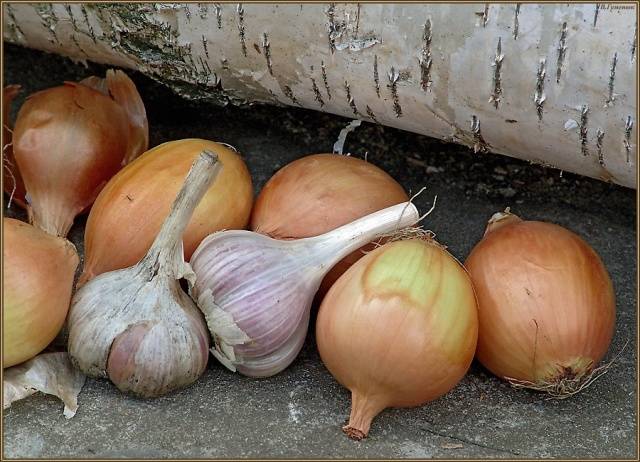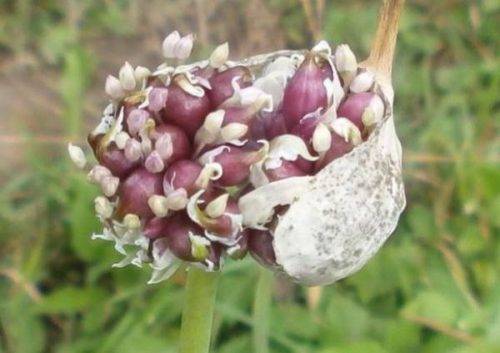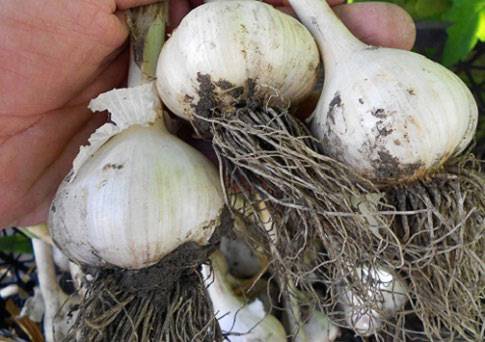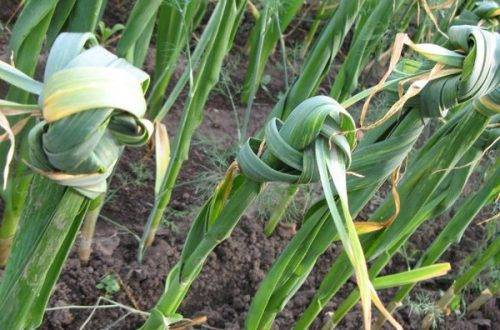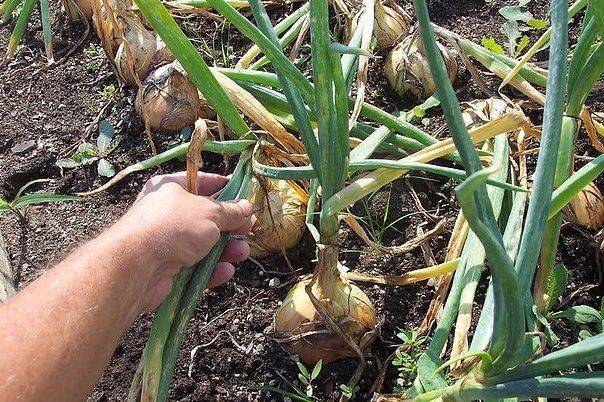Content
Every gardener dreams of growing a rich harvest of various vegetables, including onions and garlic. Even a beginner can handle this when applying agronomic principles. But getting a large number of useful heads is half the battle. After all, the products still need to be preserved until the next harvest.
Novice gardeners are often interested in dig up the garlic and onions so that they do not lose their presentation during storage, do not dry out and do not rot. We will try to reveal these questions in the article. Since only ripe vegetables are perfectly stored, you need to choose the optimal harvest time from the beds.
Determine the timing of harvesting garlic
General information
Two types of garlic are grown on the backyard and summer cottages - winter and spring. One is planted before winter, the other - in spring. Since the planting dates are different, then vegetables are not harvested at the same time.
In addition, maturation will depend on the following factors:
- the region of residence of the gardener;
- prevailing weather conditions;
- varietal differences;
- performing agricultural techniques.
Although there are a number of general nuances, thanks to which you can determine the readiness of garlic for harvest:
- the husk is easily removed;
- yellowing of the stem and tops begins from the bottom up;
- the heads are dense, without cracking, the denticles are well separated.
Winter garlic
It is more difficult to decide on spring garlic. But to recognize the ripeness of winter varieties, the bulbs on the arrows allow. As soon as they appear from under the cover, the garlic is ready for harvesting. It is undesirable to leave arrows on all plants, since the teeth are smallish. But on several garlic flakes, they are necessary as guidelines for harvesting.
Spring garlic
Spring planting garlic is called spring garlic. The cloves are planted in the ground at the end of April, beginning of May, while the activity of the onion fly is minimal.
It is easier to decide on the timing of harvesting for those gardeners who plant winter crops varieties of garlic. As a rule, the turn of spring plantings comes in two or three weeks.
You can visually understand that a vegetable planted in spring is ripe by the following signs:
- leaves located at the base of the stem turn yellow;
- the stem and upper leaves lose their brightness, but still remain green.
Spring garlic is harvested in the last decade of August, early September. It all depends on the climatic conditions of the region.
Regardless of whether the spring or winter varieties are planted, they must be dug out before the shirt on the head cracks. If the teeth are separated from each other, such garlic is not suitable for storage. You can check when to dig the bulbs out of the garden by pulling one or two plants out of the ground. If the head has formed, then it's time to clean up.
Gardener Secrets
Weather is an unpredictable phenomenon. If the rains are charged, then the ripening of the garlic slows down due to the abundance of moisture before harvesting. Plants remain green for a long time, they can release new roots, which will negatively affect the quality of the crop and its keeping quality.
What can be done in this case:
- choose the ground from under the plants, exposing the heads;
- tie the greens into knots so that the outflow of nutrients into the bulb begins.
If at this time the heads are formed, and the tops remain green, it is best to dig out the garlic without cutting off the stem. The harvested crop is harvested in a ventilated room and left to ripen. Over time, the leaf will give up useful substances, turn yellow.
Harvesting onions
Onions, as well as garlic, must be harvested in a timely manner. Overripe bulbs are poorly stored. How do you decide that a given vegetable is ready to be dug up?
First, about harvesting onions you need to take care already during planting of the seed - remember the number. Typically, bulbs mature 70 to 75 days after planting.
Secondly, the external condition of the plant will tell you when to dig out the onions. The feather begins to turn yellow, the neck becomes soft. After a while, the stem lays down. This is a signal that the bulbs are ripening.
Of course, it is impossible to name the exact number of onions harvested, since climatic and weather conditions also affect the ripening process. In a rainy summer, the vegetation period is extended, with a drought, on the contrary, it is reduced.
Harvesting onions from the garden begins in the last decade of July. It should not take more than 10 days to harvest the entire onion plantation, otherwise the bulbs will outgrow.
Important points
The question "onions and garlic when to harvest" is often typed by users in search programs. This is really important to know. We will continue our conversation on this topic.
- The fact is that both vegetables stop watering 2-3 weeks before harvesting. This is a necessary procedure. It is necessary to slow down the development of the plant and accelerate ripening. With watering or during a rainy summer, almost ripe onion and garlic bulbs can begin a new vegetative period, and roots appear. This not only slows down the ripening of vegetables, but further reduces the quality and keeping quality.
- Know onion harvesting dates and garlic is also needed because vegetables are dug up in dry, sunny weather. Therefore, if prolonged rains are planned, then you need to remove vegetables from the garden before damp weather. They will have time to mature in a ventilated room.
Useful tips instead of totals
- Dug out onions and garlic in sunny weather are laid out on the beds so that they dry out, and the earth flew off them. Onions can be kept all day, but garlic is not more than 3 hours.
- When the garlic and onion are ready to harvest, the top scales rustle on them.
- Drying bulbs and garlic heads should be done in a breezy area.
- Timely harvested vegetables are pruned after the stems and leaves are completely dry.
- It is easy to speed up the ripening process under unfavorable conditions: slightly undermine the planting with a pitchfork to shorten the root system.
How to determine the readiness of onions and garlic for harvest:
